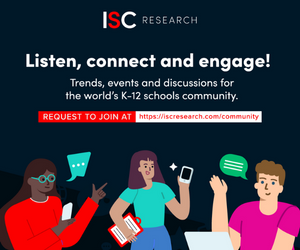ISC Research features details of the student voice initiatives of the International School of Helsinki and other international schools in its 2023 free specialist report Listening to International Student Voices.
By Rachael Thrash and Sofie Horák
Co-constructed by students and faculty in 2020, the International School of Helsinki’s (ISH) Student Voice Commission (SVC) empowers students to foster a culture of inclusivity for their peers and take action to promote equity.
SVC members act as peer helpers, facilitate restorative-healing listening circles and respond proactively when issues of bias arise in the student body. Their advocacy has inspired gender-aware signage in the bathroom, opportunities for open dialogue about exclusion and the questioning of long-held Western norms within our international school community.
The mission statement created by the students for the SVC best captures their inspiration: ‘Practice student voice to promote belonging, inclusivity, empowerment, safety, and trust’. If you ask students what they appreciate most about ISH, a remarkably broad range will tell you that they feel valued. By intentionally cultivating student leadership for inclusivity, ISH has become a more affirming place for all learners.
Truly inclusive student leadership means meeting students where they are.
Cultivating inclusive student leadership
While every school context is different, we have identified some useful guidelines in fostering inclusive student leadership that may inspire other international school educators to experiment with their own models.
1. Leverage the school mission to inspire student leadership
In 2018, we began facilitating the community process of reimagining the mission, vision and strategic plan. Our new mission resulted in three words: inclusive, challenging and engaged. The vision states that we empower and inspire one another towards thoughtful action. In order to serve this mission and vision, we established four catalysts essential for learning: wellbeing, autonomy, belonging and connection. Authentically centring these catalysts necessitated providing learners opportunities to cultivate their own wellbeing, practise autonomy, connect their learning to their lived experience and develop an environment of belonging for all. We recognised that initiation of the catalysts meant that we needed a new approach to student leadership.
2. Ensure student leadership values students’ multiple identities
It is tricky to ensure a sense of belonging for all learners in a transient, international community. Neuroscience reveals that identity and emotion are the most powerful forces of learning, but there are no shortcuts to helping each student feel both included and valued. Only when we cherish all identities can learners feel the sense of safety, belonging and inclusion.
However, too often, typical forms of student leadership showcase only students who have already developed personality traits or identities associated with traditional leaders, such as academic achievement, popularity, public speaking skills, seniority or other characteristics dominant culture associates with power. Additionally, these traditional models echo student-to-student and teacher-to-student hierarchies.
To give every student a chance to practise our four catalysts, we intentionally sought to encourage a wide variety of students to partner with adults to re-envision student leadership. From the beginning of the co-construction, we valued all perspectives, recruited students who may not self-identify as leaders, and encouraged everyone to envision their participation as an opportunity to candidly speak up for themselves and each other.
3. Invest time and resources in inclusive student leadership
In many schools, faculty assigned to student government receive marginal time or compensation to support the group running a few siloed projects, such as school dances and assemblies. In 2020, in response to Black Lives Matter, a few ISH faculty began meeting with impassioned students to develop an international student movement called STAND (Student AgaiNst Discrimination).
Valuing the significance of this group, ISH supported STAND in arranging and funding an international online student conference with local and global speakers on topics of their choosing such as neurodiversity in the classroom, racial bias in education and women in leadership. Later that spring, STAND members received school funds to meet with a branding professional and even developed their own merchandise. STAND sweatshirts became a prized item in student wardrobes.
The highly visible example of students taking authentic action against bias inspired a ground swelling of student interest in joining a student organisation with purpose. While some wanted to engage in global action, others saw their opportunity to improve the climate at school. In the fall of 2021, we funded a leadership retreat to reimagine student agency and voice at our school. The school continued to support the subsequent Student Voice Commission by compensating three faculty liaisons. Educational budget realignment earmarked funds for SVC initiatives as well as monthly SVC board meeting lunches with the school leadership team and the PTO, reinforcing the community priority on student voice.
4. Seek real audiences for students leaders to share their impact
Audience is a powerful tool in cultivating purposeful student leadership based on service to the community. We have found that there are endless opportunities in the international school network for students to present their efforts in promoting an inclusive school culture. For instance, our students have presented to the ISH board to reinforce the value of our mission in student life. They have participated in numerous webinars hosted globally to advocate for student leadership, they have published in journals, and presented live at international education conferences. We are highly grateful for these opportunities to reinforce the value of our students’ efforts.
These high-profile experiences have led to growth in our leaders and encouraged new students to join the SVC. One of our aspiring leaders overcame her shyness and barriers speaking English fluently to present at an ECIS conference because she appreciated the rare opportunity to share her experience on a global platform. Simply put, an authentic audience inspires students to hone their leadership skills.
5. Use challenges as opportunities for learning
Despite students’ best efforts and school support, inclusive student leadership will inevitably run into challenging group dynamics, mistakes, miscommunication and even pushback from members of the community less comfortable with inclusive student empowerment. Be prepared to restructure the groups, redesign the meeting schedules, reconsider the roles and remain patient. Remember that truly inclusive student leadership means meeting students where they are and teaching them the value of standing up for others, as well as learning to communicate.
As I write, we are designing another student leadership retreat to assess our current structure and consider new ways to impact the community. Student leadership is the opposite of a canned curriculum that you can repeat annually. At its essence is a willingness to partner with students to engage in the work of nurturing a healthy school climate. At ISH, we continue to proudly marvel at the fruits of this investment, the growing capacity of future leaders primed to promote global equity.
A student voice
Sofie Horák is a grade 10 student at the International School of Helsinki.
“The majority of teenagers are not delighted about attending school. In fact, I rarely meet other 15-year-olds who genuinely appreciate showing up at school. Although the older I become, the tougher school is, I feel highly privileged to say that I love attending school every day. This is since, in the International School of Helsinki, I feel intact, I feel empowered, and feel my voice matters. Every day, when I wake up, I know that my school will try its best to support me in my learning, allow me to be the individual I truly am, and give students the space to explore their identity throughout their learning.
However, I recognise that this is a rare occurrence, and this has not always been my experience either. As a daughter of a diplomat, I have lived in numerous countries and gone to multiple different schools. Before moving to Finland, I spent year 1 and year 2 of a public grammar school in Prague, Czech Republic (equivalent to grade 6 and grade 7). The Czech Republic was and still is fighting serious cases of discrimination, especially in the form of racism, homophobia, and ableism. Growing up as a young child who still had yet to develop a recognition of right and wrong, it was easy to absorb the idea that the world is unequal and there is nothing anyone can do about it. Although these discriminatory verbal, and occasionally physical, attacks happened in front of teachers and staff, they did not intervene, since they considered it to be the norm. Czechs and Eastern Europeans generally are raised with a deep sense of respect for adults and authority figures. The professors obviously knew this, since they were raised the same way. However, this inspired all 30 of my classmates to feel an extreme fear of our educators. To this day, I remember the fear and anxiety I felt every day before school, and how much I hated showing up at school for the entirety of the two years I lived in Prague.
Moving to Helsinki was challenging, and the first few months were difficult, considering I was obligated to adapt to a remarkably different environment and change my mindset on various concepts. Despite the fact that ISH was a tremendous improvement compared to my previous school, it was not perfect, and I have had frequent experiences where my classmates or I were discriminated against by fellow students, and in rare cases by teachers.
The first time I heard about a genuine student leadership group was at the end of eighth grade. Throughout the past two years, a cohort of faculty and students have worked together to develop a student leadership model to give students the opportunity to improve the community and create a sense of belonging for everyone. The Student Voice Commission (SVC) is an essential part of the school, allowing pupils to voice their opinions throughout the school and intervene on matters they consider important. The SVC gives students the space to work in situations such as what I can do right now – writing this article, organising events to better our community, attending international conferences and many more. Since I am familiar with the feeling of not having a voice, the opportunities I get right now are extremely significant to me. Through the SVC and generally through giving pupils the opportunity to develop their leadership skills, explore their identity and develop their impression of responsibility, those are the best opportunities educators can provide their students with to prepare pupils for their future.
Understand that building an authentic student leadership model is going to be a difficult process and it will have its ups and downs, it is going to be worth it, and your students will be forever grateful to you. Empowering students is challenging because it consists of taking risks, and putting your trust in students. But it is worth it because after time this trust will develop into a sense of community and wellbeing in your school. Honouring pupils’ needs, wants and comprehension of leadership corresponds with honouring their mental health, which is essential to healthy teen development, and for everyone. Giving students space to lead is the best one can do for their future, and it creates possibilities for all. I now know that student leadership, student voice, and trust between students and teachers are achievable – which is something I would never have believed four years ago.”
 Sofie Horák
Sofie Horák
 Rachael Thrash
Rachael Thrash
Rachael Thrash is the Catalyst Lead of Connection and Autonomy, and teacher of Language and Literature and Sofie Horák is a grade 10 student at the International School of Helsinki in Finland. Connect directly with Rachael on LinkedIn



